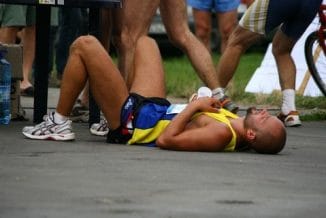
Overtraining after training – how to avoid it?
There are many benefits that anyone who regularly engages in physical activity knows. These include better well-being, excellent health and trouble-free weight. Sometimes, however, intensive training can have a worse effect, which is overtraining. It is the result of certain symptoms which can be very painful. For this reason, it will be better to avoid it.
Read also: Best pills for weight loss
Contents
Overtraining and its symptoms
Repeated high intensity and high frequency training for mass and too long endurance exercises can often result in excessive strain on the muscles or joints. The symptoms may also include exhaustion of the body and disrupted recovery process. The most common symptoms of overtraining are:
- Pain in joints and muscles
- Decreased performance and training power
- Worse mood
- Insufficient energy level
- Insomnia
- Dehydration
- Decreased body weight
- Decreased muscle mass
- Less motivation and unwillingness to train
- Irritability, problems with concentration
- More frequent injuries and worse body recovery
See also: Fat burners ranking
What to do not to overtrain?

Muscle overtraining is becoming more and more common in people who are trying to achieve the best visual effects in a short time in the form of muscle tissue growth, body sculpting and a decrease in fat mass. Too frequent and long exercises performed tediously, which are not adapted to the real possibilities, make the body fall into a state of increasing exhaustion every day, which gives us the symptoms mentioned above.
The most effective way to prevent overtraining is to observe your own body and how it reacts to workouts. If after a daily workout of one and a half hours we wake up in the morning very tired and feel muscle pain, it is worth reducing the frequency of our exercises. Controlling our body’s reactions is the basis which will allow us to optimise our exercise programme so as not to overload the body, cause injuries and disturb the biological regeneration process.
It is also good to remember to put these unique rules for exercisers into practice. According to them you should:
- Take care of a diet rich in all nutritional values.
- We should alternate days of hard training with rest or lighter exercises.
- Take care of a good quantity and quality of sleep.
- Avoid overtraining and gradually increase the intensity of your workouts.
Overtraining – how to treat and help an exhausted body?

If you get your body into such severe overtraining, temporarily giving up training will be the only way to help your exercise-fatigued body recover. Those who do not want to give up exercise altogether should rather reduce its frequency and intensity by at least a half. In addition, we need to fight the effects of overtraining, so it will be worth reaching for more sleep and relaxing massages or stretching exercises that eliminate muscle tension.
It is also a good idea to enrich your diet with products that contain many vitamins and minerals, Omega-3 fatty acids and easily digestible protein. You can also use dietary supplements, characterized by a regenerative effect. In the situation when we acquire injuries and contusions through intensive training, it is worth consulting an expert on the treatment of overtraining.
Read also: Chlorella and Spirulina



